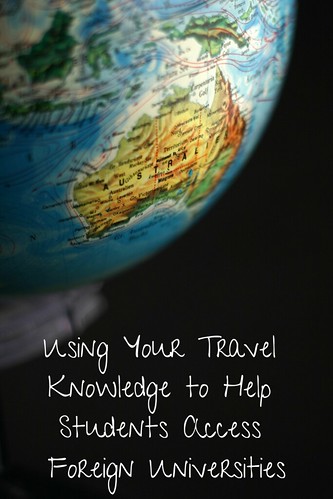Using Your Travel Knowledge to Help Students Access Foreign Universities
One of the best things about being an educator is the fact that we are continually learning and striving to improve our knowledge base. We regularly categorise our experiences and store them for later, trying to gain as much as we can from each experience, and always thinking about our own teachable moments.
Whether you are a full-time teacher, a tutor, or you just teach casually, educating is all about leveraging our knowledge to help others. Traditionally, we help others learn new concepts and techniques, but our role as educators beyond a classroom environment. We can use our knowledge and education to help our pupils learn life skills and achieve their dreams, too.

The transition from secondary education to university or college is one of the most stressful parts of a student’s career in education. For those students that want to join institutions abroad, these stresses are amplified even further, because of the varying application systems, organisations, and the lack of familiarity with their potential new environment.
As travellers, we can use our knowledge to help these students, even if we have never visited their prospective new country ourselves. Here’s how:

Admissions Research
The first and most important part of helping students get into a foreign university is guiding them through the admission procedure. To do this, educators will need to use both their travel knowledge, as well as additional research into the processes involved.
From a travel perspective, advise students on commonly respected behaviours and writing styles in their chosen country. For example, if you are based in the USA and have a student hoping to join Cambridge University in the UK, then encourage them to use British English throughout their application. In the same situation, you will want to advise your student to avoid an arrogant approach to their application, as the UK is a country that traditionally values modesty over boastfulness.
There are also plenty of services like this which can be used as resources for admissions advice or assist students through the process. Regardless of whether you have been to the prospective country, there’s always something that you can offer to your student.
Cultural and Social Norms
After the completion of the application process, you can start to impart some of your more general travel knowledge. Soft skills like social adaptability, understanding body language, and general interpersonal communication are impossible to teach in the classroom and only come with practice and time. However, even if you are an incredible socialiser, the different cultures and social norms around the world can still catch you out.
If you have travelled to a foreign country that you know one of your students might be entering as part of their university application, try to explain the norms of the country. This could include menial things, i.e., how people usually dress, words that people regularly use, and eating habits, through to more serious points, like cultural taboos and expected behaviours. Whatever you know might be the difference between your student getting their place or failing at the interview stage.
Travel Habits
As a final note, particularly if you are aware that a student is definitely going to be leaving the country, make sure to talk to them about good travel habits. This is especially important for long-haul flights where, if something does go wrong, students might end up stranded or struggling.
Whilst it’s unlikely that your pupils will be heading to university in a dangerous country, it’s still always important to embed good systems and techniques for staying safe on the road. As a traveller, you will know what these are, whether it be wearing your rucksack on the front of your body, avoiding the desire to fall asleep on long journeys, or using a travel bag with support clips to ease back pain–anything might help your students.
As educators, our role is to impart knowledge, whether it be in our field, or something more abstract, like travelling. Never be afraid to help students in any way you can, you never know what they might remember and use in the future.

-

- Log in to post comments



















